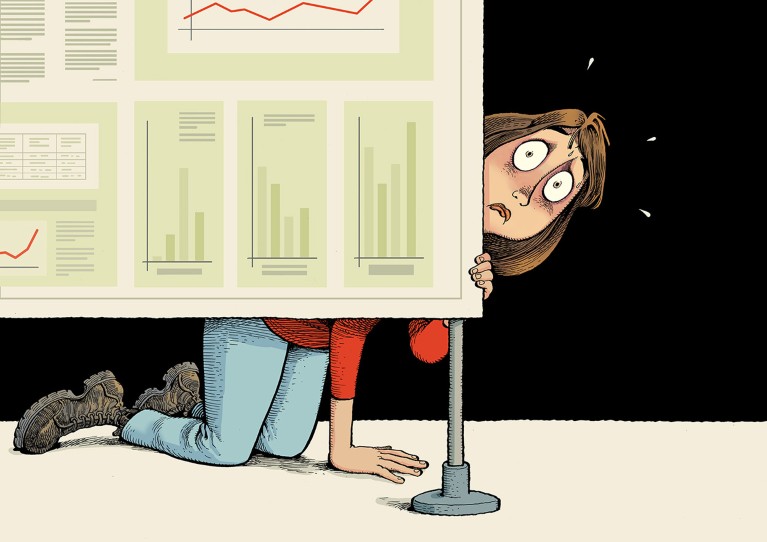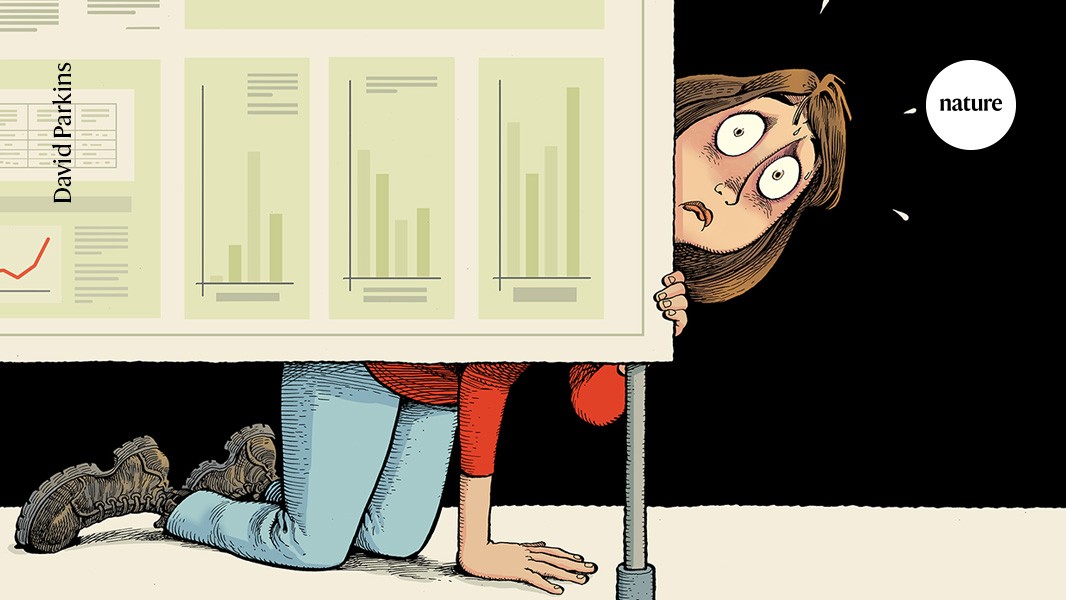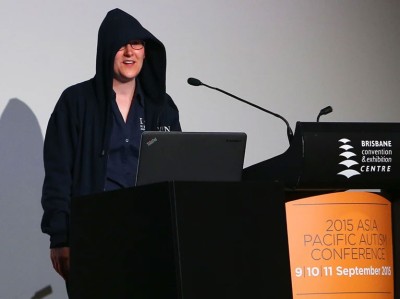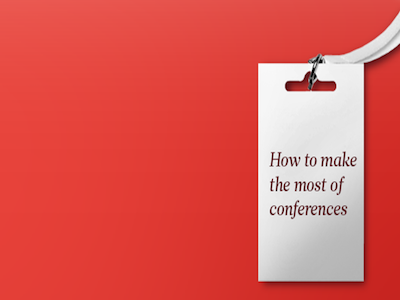
Illustration: David Parkins
The advice
Nature reached out to two researchers and an ADHD coach for advice on how to manage nerves and deliver a great conference presentation. All three emphasized that it’s completely normal to feel nervous and overwhelmed in a conference environment.
“I have so much empathy for this situation,” says Susan McConnell, a neurobiologist at Stanford University in California. “At a poster, it is chaotic. You can’t control when people come and go, or if they’re having side conversations. The first thing is to acknowledge that presenting a poster is much more challenging to control than giving an oral research presentation.”
McConnell recommends that, before going to a conference, you prepare two versions of your poster presentation and practise each out loud several times. “The first one should be very short, no more than three or four minutes,” she says, noting that most people don’t like to stay at a single poster for too long. This version should cover the main research question, what you did, what you learnt, and why your project is exciting and ambitious. “It’s exhausting, because you’re going to have to do that over and over and over again as each group comes to the poster,” she says. “But you can start to recapitulate that sense of control that you have in a talk.”
How I became the ‘hoodie girl’: attending conferences as a neurodiverse scientist
Another benefit of preparing a short version of your presentation is that it can help you to navigate the ebbs and flows of conversation. “Even though it’s chaotic, everyone who comes to your poster walked over there for a reason, so it’s important to give them some portion of your attention,” says McConnell. When someone new arrives, you can pause your presentation to briefly welcome them and say that although you’re in the middle of talking through the poster, you’d be happy to start from the beginning if the person is willing to stick around. “If you rehearsed your talk and know exactly how much more time you have, you can even say, ‘It will be about three more minutes before I finish up this version.’”
McConnell also suggests preparing a longer version of your poster presentation that is no more than 15 minutes, for those people who seem particularly interested and want to spend more time discussing your work. “If you rehearse it, then you have a lower chance of forgetting where you’re going,” she says.
For Mark Freiermuth, a linguist at Gunma Prefectural Women’s University in Tamamura, Japan, seven is the magic number for practice talks. During his practices, Freiermuth places a photo of his smiling seminar students at the top of his computer monitor to mimic an audience and records himself to assess his performance. “The first time I practise, there are lots of gaps because I can’t remember what I’m supposed to say. The second time, there are fewer gaps, but I usually discover I didn’t present certain information clearly. By about the sixth time, my talk is pretty good. And by the seventh time, it’s always smooth,” he says.
What is it like to attend a predatory conference?
Freiermuth, who wrote the book Academic Conference Presentations: A Step-by-Step Guide (2023), also suggests practising a poster presentation three times in a big auditorium with fellow students and colleagues. Not only does this approach help presenters to get acquainted with where to stand and how to use their poster effectively, it also gives them a chance to answer questions and receive feedback from familiar faces. “When similar topics come up at the actual conference, you’ve already fielded those questions, which helps you feel much more relaxed,” he says.
Laurie Dupar, founder and director of the International ADHD Coach Training Center, says that once you arrive at a conference, it might be helpful to explore the presentation room to work out where you’ll be speaking. “I would make sure that you’re comfortable in the space,” says Dupar, who is based in Blaine, Washington. The centre says it trains ADHD life coaches to be able to “increase awareness of ADHD in their communities and empower their clients to live with ADHD”.
If you feel uncomfortable in your presentation space, Dupar says, it’s completely OK to advocate for yourself and ask the conference organizer to move your location to a more open spot, for example. “You might say, ‘I’m really looking forward to giving this presentation and want to ensure it’s as effective as possible. I think a different location might better support that goal. Would it be possible to discuss a more suitable space?’ or ‘I understand that making changes might be challenging, so I’m open to any suggestions that might help create a more comfortable environment for the presentation,’” says Dupar.
Collection: Conferences
She also emphasizes the importance of relaxing before your presentation. “I think most people have no idea how overwhelming it’s going to be to go to a conference,” she says. “If you’re someone who has an introvert energy, it might be better for you to sleep in that day or take a break for two hours in the afternoon to regroup.”
Even with ample preparation, nerves can still throw even the best public speakers off balance. If you start feeling anxious during the poster session, it’s completely fine to step away for a few minutes. “Do some breathing, get something to drink, use the bathroom, stretch, recover and come back. It’s really important to take care of yourself during the poster session,” McConnell says, adding that practising physical relaxation techniques, such as controlled breathing or taking a brisk walk, can help to slow down your heart rate and calm your nerves.
Although it’s easy to feel bad about yourself for not giving a great presentation on your research, McConnell emphasizes that people often overestimate how memorable their performances are. “I would encourage you to practise self-forgiveness and remember that the audience wants you to succeed. They’re cheering for you to do a good job. When speakers are struggling, most audience members tend to feel sympathetic rather than judgemental.”





